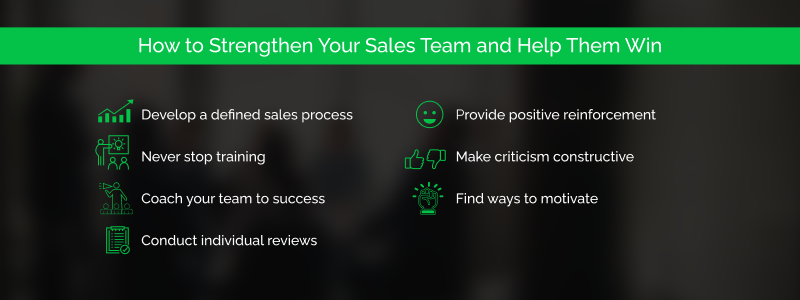How to Strengthen Your Sales Team and Help Them Win

A proactive approach to dealing with common reasons for failure can help your sales team rise to its full potential.

Salespeople fail for many different reasons. Sometimes, they’re new, and they don’t understand your expectations or processes. In other cases, they land a few deals, but they can’t consistently close prospects. Some sellers reach a certain level of success and then flatline. Their skills stagnate, and they don't know how to get better. Others lack motivation, don’t know how to manage their time, or aren’t results-oriented.
To develop and maintain a successful sales team, you need to know how to deal with all of these different reasons for failure and develop processes that proactively address them. Your business needs a strong sales team if you want to be successful. So what’s the key to strengthening your sales team? Check out these tips.
1. Develop a defined sales process
To optimize the talents of your sales team, you need to show them what you want. This helps new salespeople understand your expectations, and it helps senior salespeople stay on track.
A defined process also ensures that everyone approaches sales the same way. They’re ready to go with a strong pitch that has been thoroughly tested. They’re armed with rebuttals for the most common objections. They’ve practiced establishing rapport, building urgency, and setting tight deadlines. And they also know how to use your sales technology to optimize the process.
2. Never stop training and coaching
Building a strong sales team involves a lot more than a few weeks of training for new hires. You must commit to constant training. Of course, you want to make sure that your salespeople are well trained and feel confident before they start engaging with clients—but don’t stop there. Brush up core skills with daily or weekly role-playing sessions. Breathe new life into your team’s sales techniques with micro training sessions or quarterly retreats.
As you work with your salespeople, focus on coaching rather than training. Training generally takes a top-down approach. It focuses on knowledge and skills. Coaching, in contrast, develops a partnership between leaders and salespeople. It helps salespeople increase their self-awareness about their skills, behaviors, and attitudes. Coaching helps your salespeople optimize their knowledge and skills.
3. Conduct individual reviews
Strengthening your sales team requires you to look at the parts as well as the whole. Set up regular one-on-one meetings with the individuals on your team. And reach out when you notice an issue, such as stagnant or failing numbers.
But even if you don’t see a problem, make sure that you reach out to your salespeople regularly, regardless of how they’re performing. Just because someone’s posting high numbers or leading the team doesn’t mean that they’re happy or making the most of their potential. They may be able to do even more.
Get to know your team members. Learn what motivates them and what they need to be more productive. Find out where they have questions and what skills they want to improve. Then give them the tools and strategies they need to be as successful as they can be. Help your individual team members set goals that inspire and drive them to succeed. This will be different for everyone.
4. Provide positive reinforcement and constructive feedback
Whether you’re meeting with your salespeople as a team or as individuals, be careful about the feedback you provide. Make sure that you provide positive reinforcement. This is critical for ensuring that people know what they’re doing right and continue to do so. It also helps build confidence and makes people more open to the rest of your message.
It’s impossible to be perfect. Your salespeople need to understand that criticism is inevitable. It’s part of their professional development process. Ideally, they should welcome criticism, but whether they do or not often depends on how you deliver it.
Focus on constructive criticism and actionable feedback. Don’t just tell someone what they did wrong. Show them ways that they can fix it. Help them improve. This goes back to the concept of coaching. As you work to develop your sales team, try to create a partnership rather than a dictatorship. If your people feel like you’re invested in their success, they will be more receptive to direction than they would be if they felt like you care only about the company’s bottom line.
5. Keep them motivated
Motivation is important for any employee, but it’s critical for salespeople. They have to deal with a lot of rejection, so they need to feel driven. The classic sales motivation is commission, and while this can be very important, it can’t be the only tool in your box.
You need to find ways to build intrinsic motivation. Motivate your salespeople with goals that are competitive without being impossible. Recognize their achievements publicly in team meetings or on leaderboards, but also go beyond sales numbers when identifying achievements.
If a struggling salesperson does something right, point it out. Let them know that you noticed. Even if they lost the sale, compliment them on what went well. If people feel like they’re failing all the time, they often just give up. If they know they’re doing something right, they’ll keep trying until they get everything right.
Help your salespeople be more successful by giving them better leads. Or find other ways to set them up for success, such as mentoring programs. Giving someone more responsibility is often a great motivator. It shows them that you trust them and believe in their abilities.
Your business’s success hinges in large part on your sales team. To manage them effectively, you need to understand the most common reasons why they fail, and you need processes that circumvent those risks.
We can help. At MetaGrowth, our focus is on your sales team. We have extensive experience, and we can help you recruit, train, and develop a sales team that will take your organization to the next level. Don’t get stuck in founder selling or trapped by common failures. Instead, contact us today and let’s talk about how we can improve your sales team.
Written by
Joe Arioto
